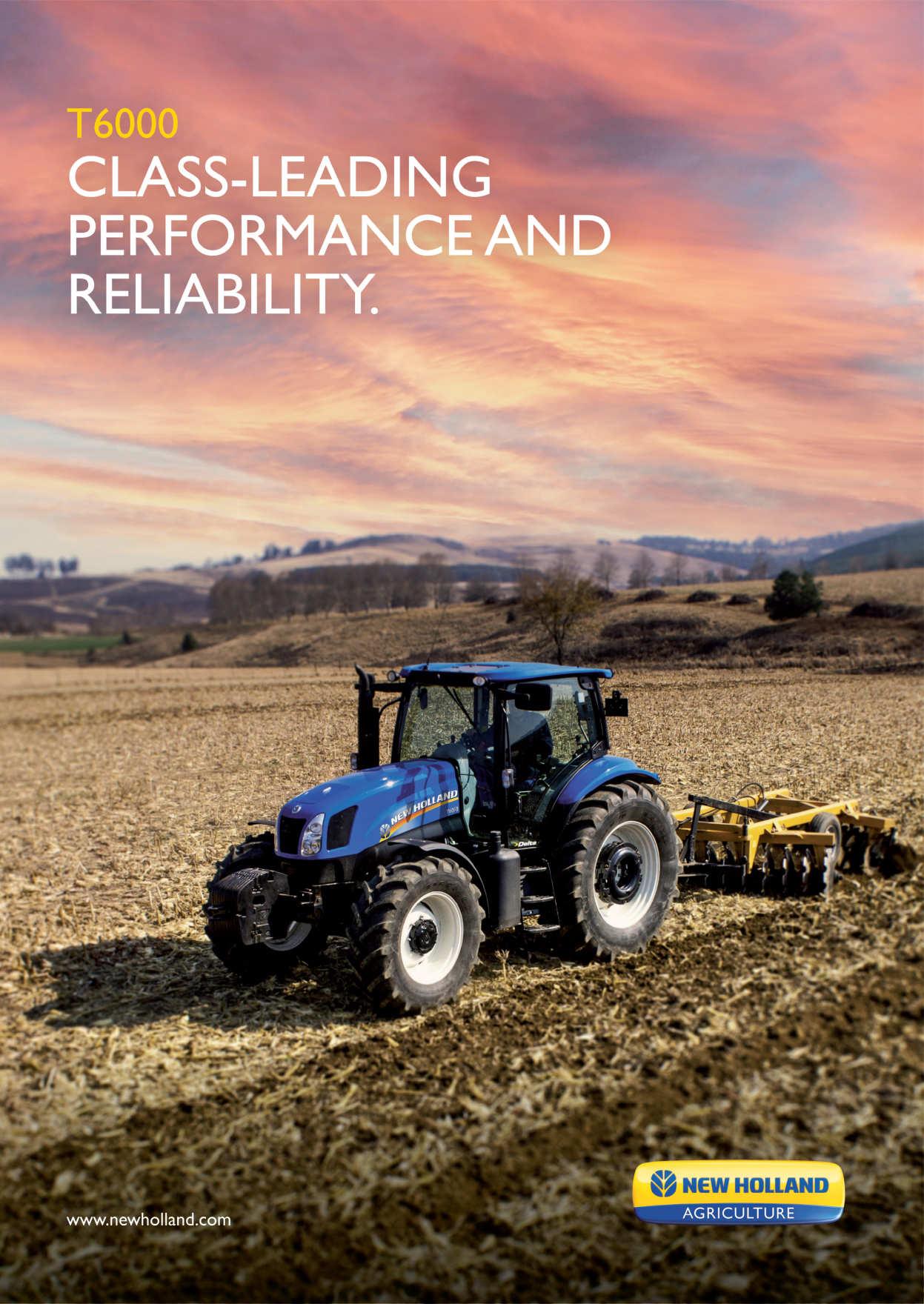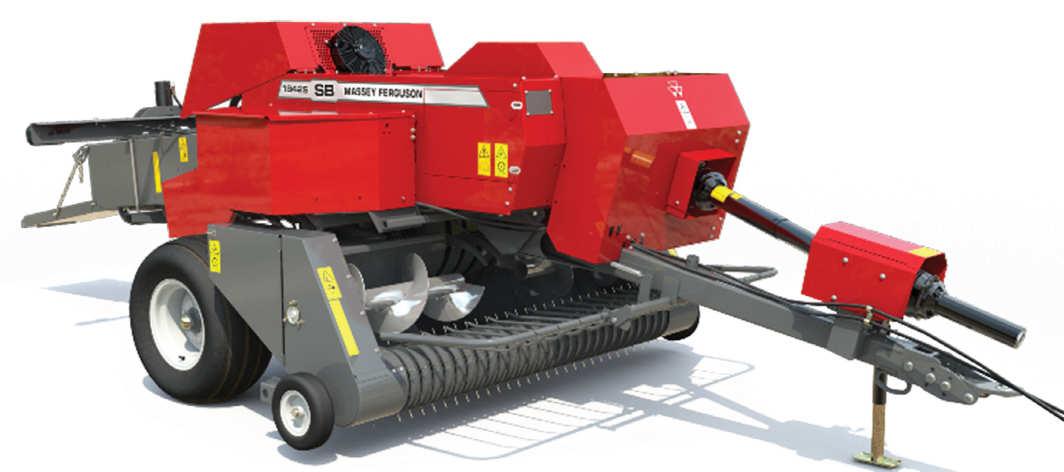
12 minute read
Equipment
A baler is necessary for farmers to make harvested crops more convenient to store, and retain nutrients. The global market for agriculture balers is expected to grow at a CAGR of 5.0% during 2021-2026.
Make hay while the sun shines
The premium MF 1842S has excellent strength and reliability required to meet high output demands.
WHEN A CROP is cut and raked into a windrow, it needs to be collected to be able to be stored and/or sold. A baler compresses this cut and raked plant material and binds it with some form of binding, like twine, wire, or netting.
A baler is used to take cut and raked crops, like hay, cotton, silage, etc, into compressed bales.
These compressed bales of plant material make them easier to transport and handle throughout the consumer cycle. A properly baled bale of crops will retain more nutrients for later use, whether it be for livestock or something else entirely.
We take a look at the recent developments in the balers equipment market.
Case IH
Designed for larger livestock farmers and contractors, the Case IH RB 456 and 466HD Pro Round Balers produce higher density bales in a wide range of crops, from wet silage to dry straw. For top reliability and throughput, it has been fitted with heavy duty components and fewer moving parts.
CASE IH stated that the baler is able to handle up to 30 tons per hour, the RB HD Pro has been designed to manage everything from straw and hay to haylage and silage at different cut lengths, thanks to new no-slip dual drive rolls and a wide range of knife sets selectable from the cab. An extra-wide diameter rotor helps prevent blockages, while an Active Drop Floor means any that do get through can be cleared quickly.
The Balers come in two bale size options: the RB456 HD Pro makes 120 cm-wide bales from 90-165 cm in diameter, while the RB466 HD Pro’s are also 120 cm wide but from 90-190 cm in diameter. Each size comes with three rotor options: a feeding rotor, 13 cutter knives or 25 cutter knives, making six models in all.
Massey Ferguson
Massey Ferguson, a worldwide brand of AGCO, has announced the launch of the premium MF 1842S high capacity, in-line small square baler. This new model delivers the exceptional outputs required by contractors and professional users looking for maximum performance to make standard size bales.
“Developed by baler specialists at the renowned Hesston factory, the MF 1842S is a premium, super heavy-duty machine, capable of making the highest number of bales to secure crop quality in tight operating windows,” explains Jérôme Aubrion, director marketing, Massey Ferguson, Europe & Middle East.
The new baler, which makes standard, 14x18 inches bales, builds on the success of the market leading MF 1840, which has an enviable reputation for performance, reliability and low costs of ownership.
“Engineered to the highest standards, the new MF 1842S employs well-proven high capacity components from the MF 185 large square baler and other models sold in North America. These combine to deliver considerably higher outputs for operators needing significant extra feeding capacity, much greater outputs and higher densities, if required,” Aubrion added.
The heavy-duty chassis and frame are the strong foundations around which the new MF 1842S is built. Designed to handle high loads this provides the excellent strength and reliability required to meet high output demands.
PTO power is transmitted via a new primary shaft with mid-mounted support, which ensures it remains perfectly in line with the drawbar at all times. A significantly heavier duty slip clutch protects the driveline and delivers 20% more torque than the existing MF 1840 design.
The MF 1842S gearbox is specifically engineered to handle more power and high baling loads. Proven on high capacity balers sold in the USA, it has a great reputation for its reliability and long service life.
Inherited from the highly regarded MF 185 large square baler, the 1.98 m wide pick-up comes with a great reputation. Equipped with a high speed reel, which operates at 145rpm (37% faster than the MF 1840), this feeds the crop to two large, 330 mm diameter cross augers. Together they offer exceptional feeding capacity to boost productivity.
To match the baler’s high performance Massey Ferguson specifies heavy-duty and reliable Rasspe knotters on the new MF 1842S baler. Made from well proven components, these deliver superb, dependable operation and are capable of working with many different types of twine.
The company has also announced a series of improvements to its MF 2200 Series of large square balers. The newly included features and upgrades will better the durability, performance and ease of use of the five models in the 2200 Series.
According to Farm Contractor, included in the 2200 Series is the new MF BaleCreate terminal display. This allows operators to set-up and monitor important functions via three, selectable work screens. Operators can swipe between the three screens, much like a tablet, for simple yet comprehensive electronic control of the entire baling sequence.
Using the BaleCreate terminal display, operators can now electronically control bale length. The system continually monitors the size of the previous ten flakes and ensures that target bale length is maintained to within half of an average flake size.
Meanwhile, the round baler is fast becoming the primary home for tractor implement management systems (TIM), with Massey Ferguson becoming the latest company to equip its machines with the technology. The new TIM specification provides high levels of automation, including stopping the tractor. Other new features across the range include automatic greasing and an entry-level touchscreen control terminal.
John Deere
John Deere has established an allied agreement with Mike and Jason Grady of Twin Pak to better serve existing and future John Deere small square baler customers. "These agreements bring together a revolutionary patented design for small square balers with a best-in-class dealer network,” said Rob Rippchen, global baling and mowing business manager for John Deere.
“We are excited to work with John Deere and more than double the productivity of farmers putting up small square bales, letting them to do more with fewer operators,” said Jason Grady, CEO of Twin Pak.
A recently published Fact.MR study foresees that the demand for agriculture equipment is projected to expand at a CAGR of 4% in terms of value by the end of 2032. h
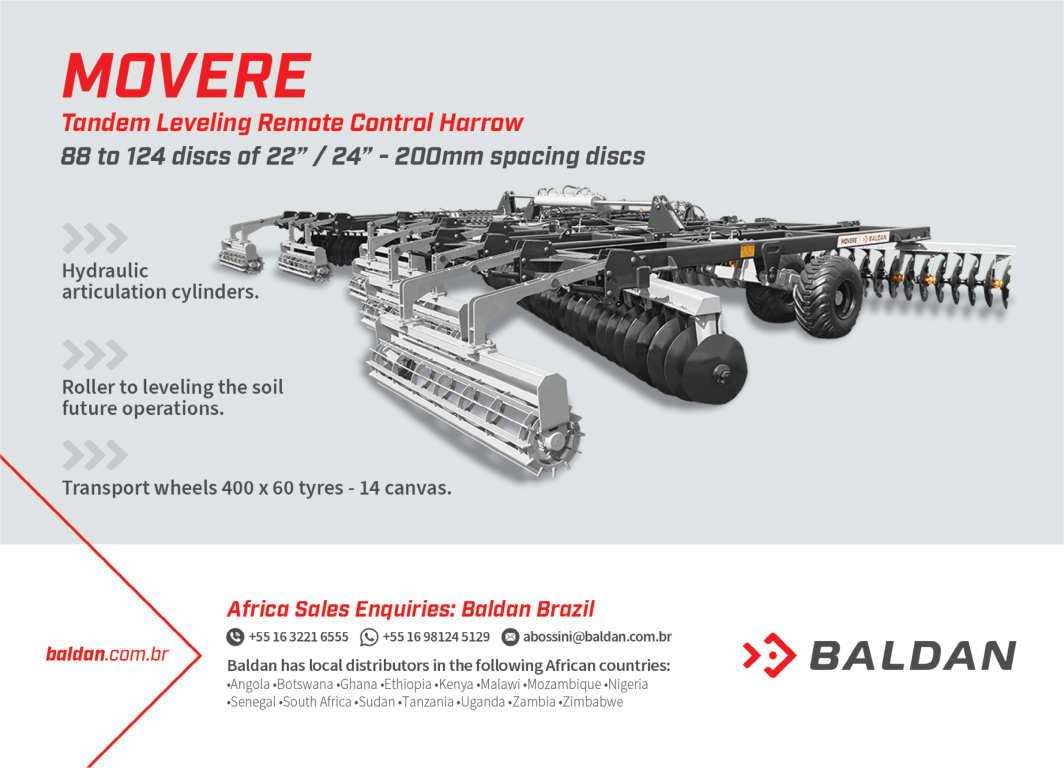
Grading agricultural commodities ensures that farmers adopt quality specifications for their products, which in turn avoids market malpractices and ensures consistency in quality.
Picking out the perfect produce
ALTHOUGH FRUITS ARE one of the world’s most commonly consumed types of food, their popularity doesn’t make it any easier for businesses to grow, sort and pack them.
Soaring standards required by different markets tend to call for technologies that allow businesses to maintain the quality. According to TOMRA Food, a leader in post-harvest solutions, the value of the global apple market is approximately US$79bn per year. This can profitably sustain thousands of growers and packers and allow them to stay competitive. And staying competitive is made much easier by adopting state-of-the-art sorting and grading technologies, which solve the challenges packhouses face.
TOMRA’s solutions for apple packhouse operations include the TOMRA 5S Advanced sorting and sizing platform, Spectrim sorter and grader, UltraView inspection module, and Inspectra² apple grading system.
The TOMRA 5S Advanced builds on Compac’s Multi Lane Sorter,
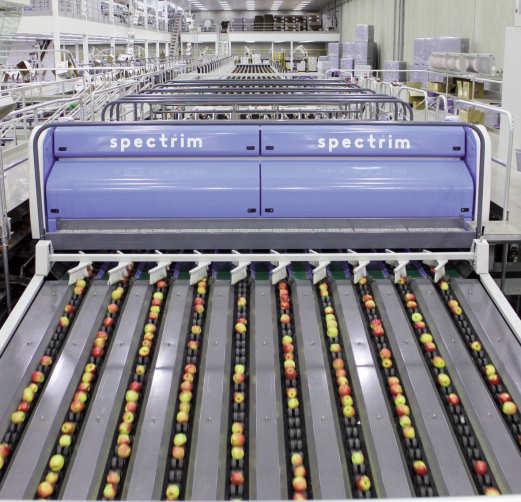
TOMRA’s solutions for apple packhouse operations include the TOMRA 5S Advanced sorting and sizing platform.
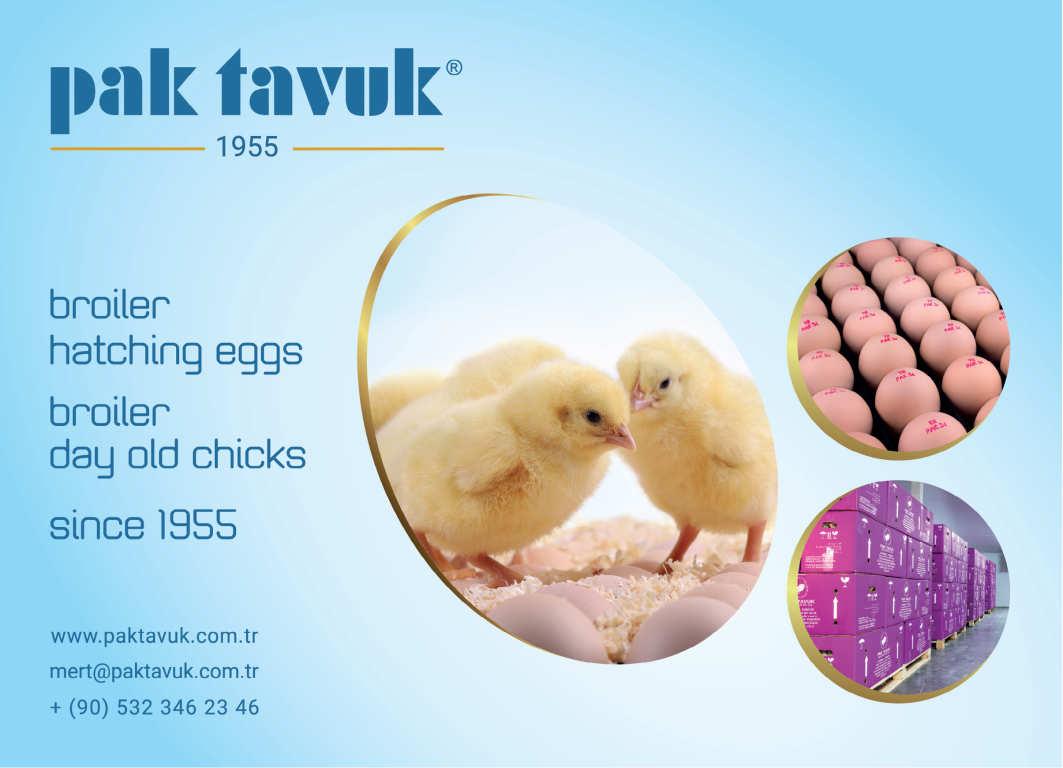
but was redesigned from the ground up.
The platform is truly designed for hygienic operation, with toolless cleaning and sanitisation, and 100% stainless steel and food-safe polymer contact areas. Efficiencies are made possible by the machine’s specialised software features and connectivity to the data platform – TOMRA Insight.
The TOMRA 5S Advanced’s software features provide for optimisation and efficiency across the line and include programmes for element mixing, exact packout optimisation, and throughput control, as well as a dynamic lane balancer. These features improve productivity, quality and efficiency – and can be controlled easily via the sorter’s intuitive graphic user-interface.
AI-powered sorter
The Sunsort AI machine, a sorter from Sunkist Research and Technical Services helps growers sort and grade citrus fruit more efficiently. The new sorter uses Google AI technology to assess the inherent quality of each piece it processes, including any potential defects.
According to the company, The machine’s strength is its ability to use a proprietary imaging system to automatically identify fruit characteristics such as size, shape, weight, blemishes and even the decay that might not be visible to the naked eye. Be it citrus greening, oleocellosis, or citrus cankers, Sunsortai sorters can be trained to recognise blemishes and defects. All types of oranges, lemons, mandarins, and even grapefruit have been processed with the new sorter.
“Bringing AI to the fruit sorting process allows our packhouses to dramatically increase the speed, accuracy and efficiency of their sorting operations,” said Aaron Gorsky, general manager of research and technical Services. “Sunsortai equipment can conduct a comprehensive fruit assessment and sort the piece accordingly, all in one pass. This offers substantial operational efficiencies and improvements.”
Developing farmer-friendly equipment
A research, ‘Development of a farmerfriendly portable color sorter cum grader for tomatoes’ published in the Journal of Food Process Engineering, stated that a sensor was developed with an efficient colour sorting programme, using integrated circuits along with a divergent rolling grader. The developed colour sorter-cum-size grader works on the principle of energetic reflection based on measuring the intensity of light and it comprises a feed hopper, chain conveyor, belt conveyor, three colour sensor, collecting ducts, inlet hopper, grader, outlet section, and collecting trays. The developed machine is operated by a single-phase 2 hp motor.
The performance of the developed machine was analysed by measuring capacity, sorting efficiency, overall grading efficiency, and skin damage.
Based on the performance evaluation, the maximum sorting efficiency and overall grading efficiency obtained were 94.5% and 94.1%, 94.1%, and 94.6% for ripe and unripe fruits, respectively.
The researchers said the portable colour sensor-cum-grader can be used by the farmers/traders to get higher prices in the market. The capacity of newly developed equipment was approximately 40 kg/hr with an operational cost of US$0.038 per kg of tomatoes.
TOMRA Food has published a new e-book to help food processors and packers enhance efficiencies and profitability by using information gathered by sorting machines.
The booklet, titled, ‘When Sorters Become Data Generating Machines’, explains how businesses can “connect to possibilities” with the TOMRA Insight data platform, and the competitive advantages this gives. The e-book states that businesses can benefit from digital sorting data with minimal impact – all that’s needed is wiring and a stable internet connection. The data solution’s software stores and processes the data coming from sorters and presents this in near realtime in a dashboard-style monitoring and reporting system. h
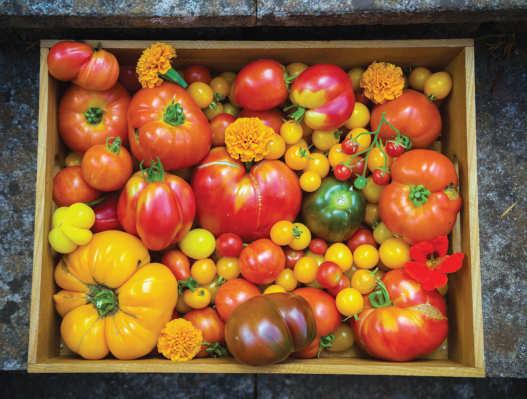
A sensor was developed with an efficient colour sorting programme for tomatoes.

The partnership between JOSKIN and its distributor Bouchard Côte d’Ivoire, allows the customer to benefit from a quality service and spare parts at competitive prices.
A winning partnership for the African market
IN 2017, THE first shipment of JOSKIN TRANS-PALM double-axle tipping trailers, especially adapted for harvesting raw palm bunches in wet areas, arrived in Côte d'Ivoire, delivered through the dealer Bouchard Côte d’Ivoire. This was the beginning of a winning partnership for both entities.
Over the years, Bouchard Côte d'Ivoire has remained true to this partnership. The company meets all demands by offering a wide range of products: single, double or triple axle, with payloads from 5 to 27 tons. From monocoque tipping trailers to dropside tipping trailers and construction tipping trailers, bale trailers, water bowsers or even slurry tankers, the range offered meets the needs and constraints of both traditional and specific farms (bananas, pineapples, palms, cassava, maize, forage). For each machine, Bouchard takes care of the delivery, start-up and technical follow-up.
For its part, JOSKIN is striving to produce machines that are increasingly specific and adapted to African countries. Roads and tracks in Africa can be treacherous, so the most suitable running gear for the customer's requirements is a must. This is why JOSKIN systematically examines all machines to ensure that they meet the demand.
The company also makes sure that containerisation is possible in order to limit transport costs.
Thanks to the production capacity of its five factories, JOSKIN ensures a high level of quality and acceptable delivery times. Over the past 20 years, JOSKIN has industrialised its manufacturing processes. Each part is therefore produced in series to a precision of one tenth of a millimetre.
Each JOSKIN machine comes with a specific parts book that is also available via the joskin.com website. For Bouchard Côte d'Ivoire, this parts book is an indispensable tool for ensuring a quality after-sales service.
Thanks to the industrialisation of its production, JOSKIN offers a large stock of spare parts in order to ensure a responsive service. As a result, Bouchard Côte d'Ivoire always has the guarantee of having the right part ordered. This partnership between a manufacturer and a dealer therefore allows the user to benefit from a quality service and the delivery of spare parts at competitive prices.
To summarise, the quality, reliability and availability of spare parts, as well as the ability to deliver within an acceptable time frame, are key priorities for Bouchard. These ingredients undoubtedly explain the dozens of machines already sold by the dealer. h
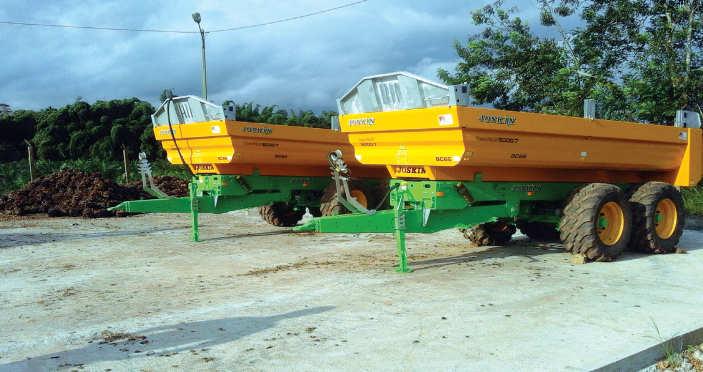
The JOSKIN TRANS-PALM tipping trailer first arrived in Côte d'Ivoire in 2017.

JOSKIN offers a large stock of spare parts to ensure a responsive service.

